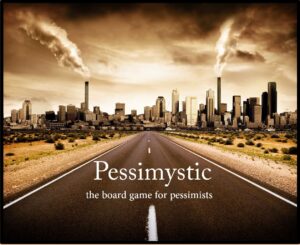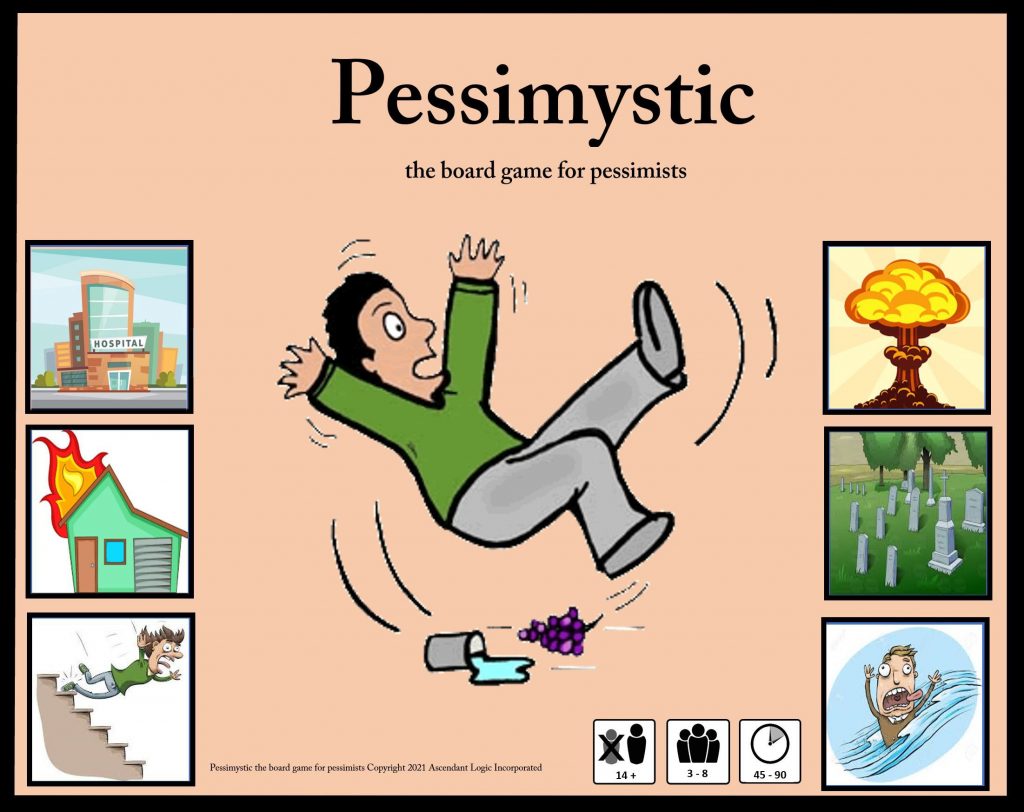Have you ever wondered how Pessimists got such a bad rap?
Let me start off by telling you that I have created a soon-to-be-released board game called “Pessimystic – the board game for pessimists”.
The inspiration for the game began when I saw an interview with a female celebrity. The questions and answers were bouncing back and forth until she was asked: “are you an optimist or a pessimist?” A long pause, some humming and hawing … a longer pause, you could see that her brain was on overdrive struggling to come up with the “right” answer. Finally, she said: “I’m a realist”.
Why was that such a loaded question? Up until that point she had been an articulate and relaxed speaker. That question almost knocked this woman off her seat. What’s the big deal? I knew that optimists have long been considered to be more successful, fun, and outgoing. Most people prefer to identify as optimists because it may have benefits for your social life. Optimists are expected to be pleasant company; they’re enjoyable to ha ng out with.
ng out with.
The long pause I mention above could have been about ten seconds. Ten seconds of silence, with a TV camera closing in on your face, is a very long time. But even under such stress, this successful woman would not claim to be an optimist. She would also not admit to being a pessimist – why not?
Let me take a crack at the logic her brain synapses were firing through during that pressure-packed ten seconds:
- If I say I’m an optimist people will like me. They will think I am easy-going and fun. But I will be admitting to being naive. All beauty and no brains. A dumb blonde perhaps. Simple-minded, goes with the flow, and doesn’t think for herself. No, I can’t say I’m an optimist.
- If I say I’m a pessimist people will think I’m too serious. They’ll think I’m difficult to deal with, that I yell at my assistants. They may even think that I suffer from depression or some other mental disorder. No, better not say I’m a pessimist.
- Ah-ha, I’ll go with realist – the best of both worlds with no negative connotations.
If you’re a realist, then you’re a pessimist. A realist can’t look at the world we live in and say: “how wonderful, everything is just great”. You’d have to be a pretty simple-minded realist. I’m sure all agree that the earth itself is wonderful and great… it’s those damn humans.
A few months later the same thing happened: a celebrity is asked the same question and she too struggled and then came back with “I’m a realist”. That’s when I began working on the game.
Is Critical thinking inconsistent with optimism?
Any of you who consider yourselves to be optimists may be insulted by the description above. There are studies which show that pessimists are more intelligent than optimists, however, some argue that pessimists only appear to be more intelligent because they have heftier topics to discuss. If Optimists avoid serious topics in order to keep things light and positive then what do they talk about when they get together? Funny dance moves on Tic Toc? A YouTube video of monkeys juggling bananas? Delicious cupcakes? How much fun they had on their vacation? Isn’t avoiding serious conversations required in order to maintain one’s optimism?
Intelligence requires critical thinking and critical thinking is inconsistent with optimism. You can’t do both.
Is asking someone if they are a P or an O too personal a question to expect an honest answer? Does it get too close to the center of the soul? It does ask one to reveal a great deal about the inner workings of their mind. Let’s face it, each and every one of us performs some level of continuous risk-scanning as part of our basic human survival instinct. Avoiding physical pain is built-in to the point where it is pretty much a no-brainer. Beyond that, we are getting into pessimistic territory and Pessimystic – the board game for pessimists has the following objectives:
- Pessimism is a set of valuable skills which contributes to one’s level of success and happiness.
- Playing the game will reveal the level each Player is at with regard to these valuable skills.
- Playing the game requires Players to become aware of the innate risk analysis taking place within their subconscious minds and articulate the risks they have identified.
- Continuing to play the game will develop these valuable lateral-thinking skills in risk identification, risk assessment, and risk reduction.
- Being a Pessimist is something to be proud of.
- It’s also fun – challenging, but fun.
Here’s a quick overview of the game:
One Player reads a card with an optimistic scenario such as “Buying a Used Car Never Hurt Anyone”. In turn, Players provide a pessimistic negative connection to the scenario. The flip side of each card contains six correct answers with a range of points. The Card Reader tells each Player if they provided a correct answer and how many squares they can move on the board.
Optimists, due to their positive outlook, are more likely to have mishaps, so if a Player answers incorrectly, they go to one of the two hospitals on the board. At the start of the next turn, Players in the hospital must answer a medical question to be released back into the game. The Medical questions are common ailments such as “name a symptom of concussion” and there are four correct answers on each card.
The objective of the game is to travel around the board and collect numbered coins. A Player can also win if at the start of a turn all other Players are in the hospital or the cemetery.
Pessimism is Realism
Looking around for some definitions of a Realist was somewhat disappointing. A Realist, apparently, sees the world as it really is without being predisposed towards the good things (Optimist) or the bad things (Pessimist). This distinction seems meaningless.
Let’s say an Optimist, then a Pessimist, and then a Realist notices a big beautiful magnificent tree.
- The Optimist thinks what a beautiful tree, I think I will sit under it and cool off thanks to the shade it provides.
- The Pessimist thinks what a beautiful tree, too bad we continue to chop down millions of acres of trees each year and our reforestation programs can’t keep up and therefore we will eventually run out of trees and the oxygen that they produce and then all forms of life will die.
- Okay, now what does the Realist say when she sees the same tree? Is there anything more “real” than the Pessimists observations about the tree? The Pessimist recognizes the magnificence of the tree and immediately performs the analysis to determine if the magnificence of trees is being appreciated by all. She then goes through the pessimistic sequential logic above to conclude that the answer is no and then defines the likely consequences. This is what each of us should think every time we behold the magnificence of a tree. And if we did, I believe that the world would be a better place (with more trees).
Let me try to answer the original question: How did Pessimists get such a bad rap?
Debbie Downer, the Saturday Night Live character, however hilarious she was, did not help the cause of pessimism. The flipside, say, Opie the Optimist, could be equally hilarious as we watch Opie stumble through a wicked world in which he is totally oblivious to all dangers, scams, and con artists. I think it would be even funnier.
The original culprits, I hate to say, are PARENTS, especially MOTHERS. Baby humans are born with no concept of danger. We have to learn it step by step, tumble by tumble. From the moment infants can walk, Mothers (and Fathers) have to perform the pessimist duties for their children and this can continue into adulthood. Children grow to resent the constant “advice” which is based on parents’ belief that they are more knowledgeable of the dangers lurking outside than their less experienced children.
And it’s true – isn’t it? Pessimism is learned, and the more you live the more you learn.
Moving along
If you are interested in the game there are links to additional info below.
If you are mildly interested you might still want to receive future newsletters.
As a pessimist myself, I, of course, don’t really expect the board game, or this blog, or the campaign to put pessimists on the map, to become successful. But hey, ya never know, even pessimists are occasionally wrong.
Thanks for your attention.
Yours truly,
The Happy Pessimyst
I shall return. Although, something bad might happen which prevents my return.
Email: pessimysticbgame@gmail.com
